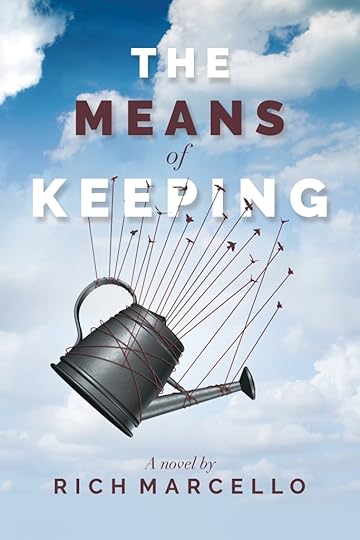The Means of Keeping Book Review by The Independent Book Review

The Means of Keeping
By Rich Marcello
Genre: Literary Fiction / Climate Fiction
Reviewed by Nick Rees Gardner
A moving cli-fi novel exploring the physical, psychological, and interpersonal issues that accompany the climate crisis
David Luca and Tereza Allard have been friends since they were young, all the way back to when the state of the world seemed hopeful. They even dated at one point, but eventually, they went on to form their own families and achieve their own individual artistic and educational goals.
Then the microburst happened: a cosmic event propelled by climate change that took both friends’ families from them and drove them to full-on self-destructive depression. As the two reconnect, they work their way out of their individual funks and strive toward self-realization at the university-cum-commune, the Ashami Institute. When the Institute fails, they move on to create their own commune, called Keeping, in hopes of making the world their children live in a better, more sustainable place.
The novel is composed of brief chapters and shifting third person points of view that zoom in on several characters throughout the story. The chapters, sometimes as short as 2-3 pages, speed up the pace of what is, at least for the first third of the book, a slow-moving plot. Much of the characters’ backstory is revealed in this first third of the book, previous love affairs, lost children, brooding feelings, and dark emotions. David and Tereza are made complex through stretches of backstory and expository paragraphs defining their interests and ideals.
But the pace picks up in the second third of the novel, as a love triangle develops between David, Tereza, and an Ashami Institute mainstay, Emma. The elaborate and involved shift of love interests packs the final two thirds of The Means of Keeping with tension between Tereza and David, but also their other partners. The two dance around the question of their own connection, but also their position in creating a future for the world for their potential children, a question that rings true in present day America as well as David and Tereza’s fictional lives a decade in our future.
Two story arcs drive the first half of the book: That of David and Tereza’s search for how to move their lives forward and that of their ever-more-complex and shifting relationship. But in the second half, a third and much more immediate, higher-stakes arc emerges when David, Tereza, and Emma draft “The Means of Keeping,” a document included in the book which lists the laws and goals of their newly formed idealistic commune.
Keeping, the commune, follows a similar arc to other 21st century ecocommune novels such as Allegra Hyde’s Eleutheria or even the works of Emily St. John Mandel. Looters bang at the periphery of what should be a perfect community while within, heads butt against each other and secret grudges emerge.
Though this third arc diverges from the first third of the book, the romantic tensions continue, intertwining to create a middle of the book that brims with suspense, much more a page-turner than the beginning or end. The looting gang, “The Sons of Tomorrow” add a more deadly and physical tension to David and Tereza’s story, acting as a catalyst that will change everything they thought they knew.
The Means of Keeping is complex, emotional, and stuffed with fun, obscure pop-culture references, from Radiohead and Elliott Smith to films that David and Tereza are both drawn to. Its complexity, as well as the fact that it spans almost an entire lifetime, makes it read almost like multiple books. It could be split into separate novels: David’s Cabin, The Institute, and Keeping; the three locations where David and Tereza explore different eras of their relationships. As a whole, it adds up to more than the sum of its parts. The will-they-wont they of David and Tereza’s relationship acts as the glue binding this book together.
Rich Marcello’s The Means of Keeping falls easily under the climate fiction umbrella, but a literary bent pervades along with a complex, less-steamy multipart romance that will keep the reader guessing. And this is where The Means of Keeping breaks the mold of other cli-fi novels before it: The focus on love, on relationships, and the battle between the practical and emotional in a world striving to survive.



